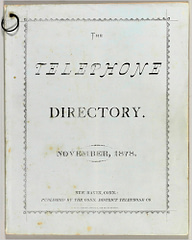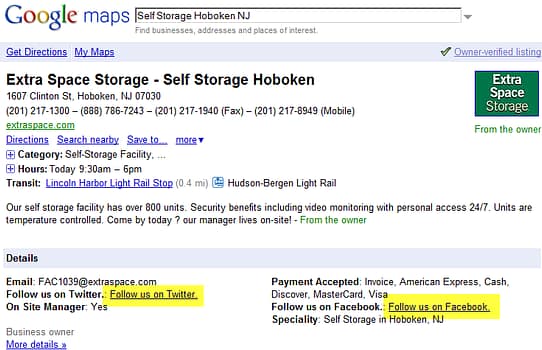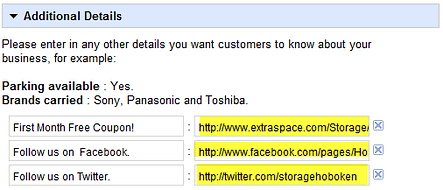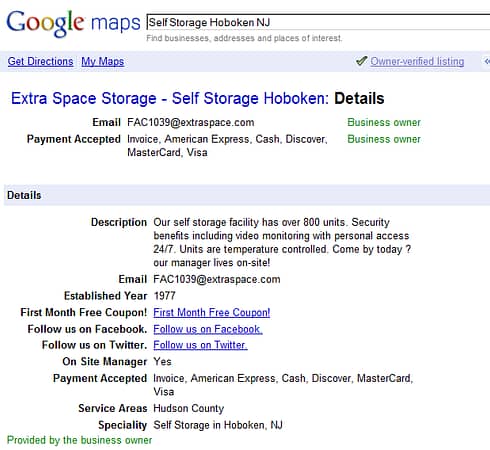
Numerous studies show most consumers use the Internet for local search. BIA/Kelsey finds 97% of consumers use web to shop locally. The below article cites a 2008 Gallup survey which reports only 11% of households rely on paper white pages, and it has certainly decreased since the survey was conducted.
As a result, major telecoms including AT&T and Verizon are seeking approval to discontinue printing white pages in many states throughout the country. This move demonstrates the importance of a local internet marketing strategy.
Companies Yank Cord on Residential Phone Books
By MICHAEL FELBERBAUM, AP Business Writer Michael Felberbaum, Ap Business Writer – Thu Nov 11, 2:06 pm ET
RICHMOND, Va. – What’s black and white and read all over? Not the white pages, which is why regulators have begun granting telecommunications companies the go-ahead to stop mass-printing residential phone books, a musty fixture of Americans’ kitchen counters, refrigerator tops and junk drawers.
In the past month alone, New York, Florida and Pennsylvania approved Verizon Communications Inc.’s request to quit distributing residential white pages. Residents in Virginia have until Nov. 19 to provide comments on a similar request pending with state regulators.
Telephone companies argue that most consumers now check the Internet rather than flip through pages when they want to reach out and touch someone.
“Anybody who doesn’t have access to some kind of online way to look things up now is probably too old to be able to read the print in the white pages anyway,” joked Robert Thompson, a pop culture professor at Syracuse University.
Phone companies note that eliminating residential white pages would reduce environmental impact by using less paper and ink. It also can’t hurt their bottom lines to cut out the cost of a service that rarely gets used and generates little beyond nostalgia.

Fewer people rely on paper directories for a variety of reasons: more people rely solely on cell phones, whose numbers typically aren’t included in the listings; more listings are available online; and mobile phones and caller ID systems on land lines can store a large number of frequently called numbers.
The number of traditional land lines has been declining for the better part of the decade, and now are being disconnected at a rate of nearly 10 percent each year, according to company financial reports.
And a survey conducted for SuperMedia Inc. by Gallup shows that between 2005 and 2008, the percentage of households relying on stand-alone residential white pages fell from 25 percent to 11 percent. Dallas-based SuperMedia, which publishes Verizon’s telephone directories, has instead focused on its yellow pages and paid advertising listings, and their online equivalents.
Unlike the residential white pages, the business directories printed on yellow pages are doing fine, at least according to the Yellow Pages Association. The industry trade group claims more half the people in the U.S. still let their fingers do the walking every month, and that 550 million residential and business directories are still printed every year.
As for the white pages, Steve Keschl can attest to the declining interest. As a doorman at an Upper East Side condo building since 1960, the 84-year-old has watched tenants’ fading reaction to the annual delivery of New York City’s white pages book — which incidentally weighs in around 3 pounds, 9 ounces, or a little more than a dozen iPhones.
These days, the books “sit here pretty long,” said Keschl, who added that even he rarely uses the directory anymore. “Sometimes they take them, sometimes they don’t.”
While New York and other cities still have stand-alone white pages, many of the thousands of phone directories across the country include residential white pages, yellow business listings and blue government pages. Where they no longer have to print the white pages, publishers will simply slim down their combined books.
Verizon and AT&T Inc. — the two largest land line players — and others have requested exemptions from state requirements to distribute residential phone books in paper form. The directories would be available on the Internet, printed upon request or provided on CD.
“You probably have a better chance of finding a name quicker if you can just search for it in a database than try to look it up in the white pages,” said Link Hoewing, Verizon’s vice president of Internet and technology policy.
Since 2007, states that have granted permission to quit printing residential listings or that have requests pending include: Alabama, Delaware, Florida, Georgia, Indiana, Missouri, New Jersey, New York, North Carolina, Ohio, Oklahoma, Pennsylvania, Texas, Virginia and Wisconsin.
New York-based Verizon’s plan is to seek regulatory approval in all 12 states where it operates land line telephone service. In total, the savings could top 17,000 tons of paper annually throughout Verizon’s service areas, the company said.
The company and its printer, which uses the Verizon brand name in lieu of payment for publishing the white pages, would not provide any estimates on the cost of printing the directories or how much money would be saved by discontinuing them.
Regulators in New York approved Verizon’s request Oct. 14. There, the company estimates it will save about 3,575 tons of paper per year and conserve the energy associated with printing, binding and distributing the directories. The company’s August request with Virginia regulators is estimated to save about 1,640 tons of paper annually.
Verizon plans to continue to deliver directories that contain business and governmental listings along with the consumer guide information provided in white pages directories, but the residential listings would only be available by request.
Dallas-based AT&T did not respond to repeated messages from The Associated Press seeking comment for this story.
According to filings with state regulators, AT&T said in places where it has been permitted to provide the white pages on demand, only about 2 percent of customers have requested a copy.
The residential phone book “no longer provides the same utility it once did,” AT&T told Missouri regulators, who approved the company’s petition for the state’s larger metropolitan areas. “The vast majority of customers neither need nor use these often quite large, bound paper directories.”
If the white pages are nearing their end, then Emily Goodmann hopes the directories would be archived for historical, genealogical or sociological purposes.
“The telephone directory stands as the original sort of information network that not only worked as kind of a social network in a sense, but it served as one of the first information resources,” said Goodmann, a doctoral student at Northwestern University who is writing her dissertation on the history of phone books as information technology. “It’s sort of heartbreaking … even though these books are essentially made to be destroyed.”
Associated Press writers Samantha Gross and Peter Svensson in New York contributed to this report.
The original source of this article can be found at Yahoo! News.
Online Phone Directory Resources:
- AT&T: http://www.corp.att.com/directory/
- Verizon: http://www.verizon.com/whitepages
- Yellow Pages Association: http://www.ypassociation.org/




